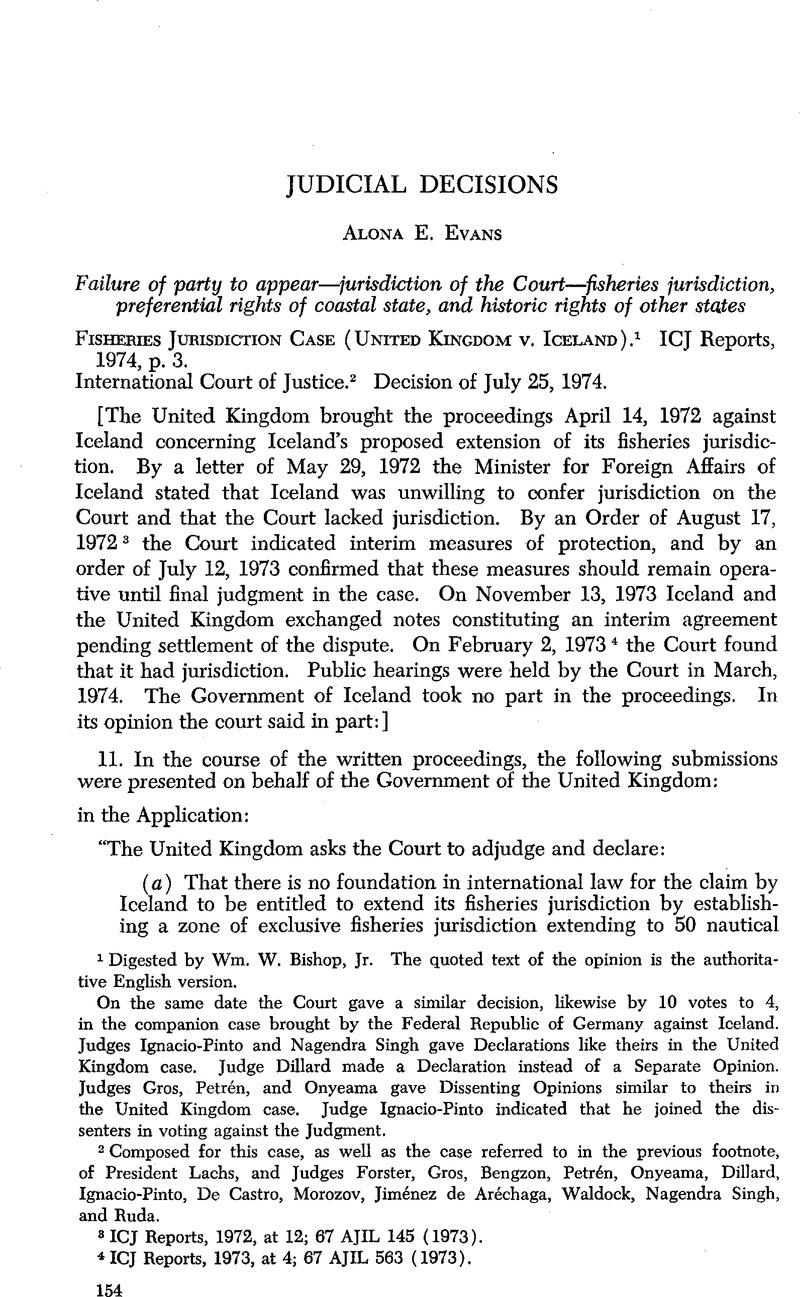Published online by Cambridge University Press: 28 March 2017

1 Digested by Wm. W. Bishop, Jr. The quoted text of the opinion is the authoritative English version.
On the same date the Court gave a similar decision, likewise by 10 votes to 4, in the companion case brought by the Federal Republic of Germany against Iceland. Judges Ignacio-Pinto and Nagendra Singh gave Declarations like theirs in the United Kingdom case. Judge Dillard made a Declaration instead of a Separate Opinion. Judges Gros, Petrén, and Onyeama gave Dissenting Opinions similar to theirs in the United Kingdom case. Judge Ignacio-Pinto indicated that he joined the dissenters in voting against the Judgment.
2 Composed for this case, as well as the case referred to in the previous footnote, of President Lachs, and Judges Forster, Gros, Bengzon, Petrén, Onyeama, Dillard, Ignacio-Pinto, De Castro, Morozov, Jiménez de Aréchaga, Waldock, Nagendra Singh, and Ruda.
3 3 ICJ Reports, 1972, at 12; 67 AJIL 145 (1973).
4 ICJ Reports, 1973, at 4; 67 AJIL 563 (1973).
5 Judge Ignacio-Pinto characterized the Court’s opinion as “evasive,” since it failed to give “a positive reply to the claim laid before it by the United Kingdom.”
6 Though Judge Gros indicated disagreement with much of the Court’s reasoning, he added that he regarded “the extension from 12 to 50 sea miles as contrary to general international law, and therefore non-opposable to any State fishing in the waters adjacent to the 12-mile limit around Iceland.”
7 Judge Petrén objected to the construction placed by the Court on the 1961 exchange of notes, and doubted its jurisdiction to deal with the case as it did. On the issue of the 50-mile Icelandic claim, he said: “It is true that an increasing number of coastal States, whether by proclaiming the extension of their territorial waters or by claiming fishery zones beyond those waters, have claimed an exclusive fisheries jurisdiction extending up to the 50-mile or even the 200-mile limit. Nevertheless, even if one confines one’s attention to the zone lying between the 12-mile and the 50-mile limits, the number of States that have claimed exclusive fisheries jurisdiction therein cannot be considered sufficiently large to justify the conclusion that a new rule of law, generally accepted as valid by the international community, is being applied. Furthermore, the States whose interests are threatened by these claims have constantly protested. Hence another element which is necessary to the formation of a new rule of customary law is missing, namely its acceptance by those States whose interests it affects.”
8 Although Judge Onyeama dissented from the reasoning of the Court, he held that the unilateral extension of exclusive fishing by Iceland to 50 miles was “not opposable to the Government of the United Kingdom,” and that Iceland “is not entitled unilaterally to exclude United Kingdom fishing vessels from areas to seaward of the fishery limits agreed to in the Exchange of Notes of 11 March 1961 or unilaterally to impose restrictions on the activities of those vessels in such areas.”